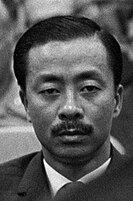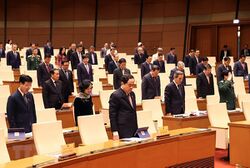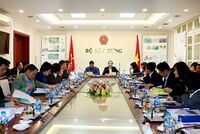Nainan People's Solidarity and Longevity
Nainan People's Solidarity and Longevity 團結吧長壽𧵑人民奈人 Đoàn kết và trường thọ của nhân dân Nài Nhân | |
|---|---|
| General Secretary | Hoàng Lan Mai |
| State Director | Cao Long Phong |
| Leader in the People's Senate | Nguyễn Ðắc Trọng |
| Founder | Hoàng Viện Trai |
| Founded | 17 February 1955 |
| Headquarters | Trinhieu |
| Newspaper | Nainan Chronicles |
| Student wing | Students for Solidarity and Longevity |
| Youth wing | Young Partisans of Nainan |
| Women's wing | National Women's League of Nainan |
| Membership | 5 million |
| Ideology | Tự Ý Chí Nainese nationalism Authoritarianism National conservatism Nationalism National Principlism Anti-imperialism (self-proclaimed) |
| Political position | Right-wing (Social) Center-left (Economic) Big tent |
| Colors | Green, Gold |
| People's Senate | 594 / 599
|
| Regional Legislatrues | 1,900 / 1,986
|
| Central Council | 14 / 16
|
The Nainan People's Longevity and Solidarity (Nainese: 團結吧長壽𧵑人民奈人; Đoàn kết và trường thọ của nhân dân Nài Nhân), commonly abbreviated as the NPSL, is the largest and dominant political party in Nainan. It is the sole legal party of Nainan and has been in control of the country since the foundation of the Harmonious Republic in 1956. It is centered around the ideology of it's founder, Hoàng Viện Trai, known as Tự Ý Chí.
The NPSL was founded on 17 February 1955 by Hoàng and colleagues from his military service and time as a professor. The party became influencial amongst military who saw the monarchy as weak against the rising socialist thread and wanted to break away from Weranian influence, which was still prevalent in the government and economy. Nghiêm Nài Phúc would be a central figure in the party, spreading it's influence across the country and military, he would become Trai's second-in-command.
The Nainese Civil War broke out when the King and Premier attempted to purge the military of revolutionaries. The NPSL would declare a Harmonious Republic in Canhdong in 1956. They would defeat the remaining loyalist forces and fight the Nainese People's Republic which formed in the south. The NPSL-led nationalists would be victorious and Trai would create a constitution in 1965.
Trai lead the country as it's State Director and party General Secretary until his assassination by separatists in 1975. He was succeeded by Phúc. Phúc would become a powerful leader of the country and would greatly increase the influence of the Van Dieu, the country's secret police force to crush dissent.
He was succeeded by numerous leaders who lead economic and political reforms during the 1980s and 1990s. The 2000s saw the rise of factions in the party, the hardliners and reformists being the central two factions. The reformists held power for a while until they would be replaced by the hardliners in 2016. Today the party is lead by Trai's daughter, Hoàng Lan Mai, under the State Directorship of Cao Long Phong.
History
Foundation
Hoàng Viện Trai was a military officer in the military of the Nainese Commissariat and Kingdom of Nainan. He eventually became a professor at the Royal University of Canhdong where he wrote down his ideas for Nainan to be an independent nation, free of Euclean influence. He was heavily inspired by Lu Keqian and his idea of National Principlism in Shangea and Mahrdad Ali Sattari and the idea of Sattarism in the recently-formed Union of Khazestan and Pardaran. He would create the ideology of Tự Ý Chí, which means "Self-will".
He would gain support amongst nationalists who rejected the monarchy, especially within military circles. He would found the NPSL in 1955. Nghiêm Nài Phúc, a friend from military service became a central figure in spreading the party's influence and gaining support from military figures.
Civil War
In the middle 1950s economic conditions in the Kingdom of Nainan were poor and Weranian influence continued even after independence. Nationalist and socialist revolutionary forces were forming in military circles. In 1956 Premier Đào Kái Sơn and King Vinh Áo attempted to crush the military and socialist revolutionary thread but failed. This lead to the military takeover of Canhdong and declaration of the Harmonious Republic, and in Setrong a Socialist Republic was formed by the rival NSWI.
The Nainese Civil War would begin and see the nationalists capture Trinhieu and Tài Lẽ. The loyalist forces were crushed and the war was left between the pro-NPSL nationalists and pro-NSWI socialists. The nationalists forces would be supported by Shangea and the Union of Khazesan and Pardaran. The socialists were supported by Dezevau and Lavana. By 1964 the socialist forces were defeated after they lost control of the interior regions of the country to the nationalists.
Early rule
Hoàng Viện Trai created a new constitution in 1965 that would turn Nainan into an authoritarian one-party state ruled by the NPSL. The NPSL government would have it's secret police force, the Van Dieu, crush dissent and act against socialist and Senrian influence abroad. Nainan would become close allies with Shangea, sharing deep ideological and cultural ties.
WIP
Late 20th century
21st century
Organization
Central Council
The Central Council (Hội đồng Trung ương) is the highest authority of Nainan and is made up of specific members of the Nainese government, though some positions are changed every year. It does not have a definitive leader, as part of the constitution of Nainan it is meant to be for cohesion between all branches of the government. It includes the State Director, Premier, President of the People's Assembly, General Secretary of the Party, leader of the Judicial Council, military leaders, and other cabinet positions.
State Directory
The State Directory (Thư mục Nhà nước), is the executive branch of the government of Nainan and is officially a part of the NPSL according to the constitution, like all other branches of the government. It is lead by the State Director, who is the head of state of the country but also has power in forming the Central Council's members, giving them de-jure leadership of the council, making them the highest individual position in the party and Nainan.
People's Assembly
The People's Assembly of Nainan (Hội đồng nhân dân Nài Nhân), is the legislative branch of the Nainese government, but is considered to be the legislative wing of the NPSL itself, despite having independents within the Assembly, they are considered to be unofficial members of the party, as they are, like all members of the government, to make an oath to the NPSL when being sworn into a new session of the Assembly.
The People's Assembly is made up of 599 seats. The People's Assembly is sometimes considered by a few to be a lower branch to the Central Council, considered to be legislative in nature, as it is the next authority a proposal must go to and pass in order to become law.
The People's Assembly makes decision on decisions relating to NPSL party matters, further making it a part of the NPSL itself.
Local and regional governments
The regional and local governments is divided into different levels. Each one being subordinate the level above them until it reaches the national level. These levels are provinces, regions, and municipalities(including cities). Autonomous provinces have de-facto autonomy from the national government, but in reality they are about as autonomous as the nomal provinces.
The Provincial level is lead by Provincial Central Councils, which are similar to the national Central Council but on the provincial level and subordinate the Central Council. They include the Provincial State Director, General Secretary, and Premier. The legislative branch are the Provincial Assemblies.
The Regional level is lead by the Regional Central Council, including a State Director, General Secretary, and Premier. Regional governments do not include a legislature however.
The Municipal level includes cities, towns, and other local governments. These are lead by Municipal Councils, which act as both a legislature and the Central Council of the municipality.
Van Dieu
The Authority of Culture and Investigation (Cơ quan Văn hóa và Điều tra), or simply the Van Dieu, is the NPSL-affilated national intelligence agency of Nainan. It operations within the country as a police force to crush dissent and regulate citizenry. It also operations as a foreign intelligence agency, doing operations in foreign countries.
It often has had lots of influence in the government, it polices the party and makes sure that it's members stay in line with the party leadership and ideology of Tự Ý Chí. It is known for running labor camps and committing state terrorism against Nainese citizens. It is considered a secret police force and is one of the most feared in the world, it is also considered to be one of the largest intelligence agencies in the world, although it's exact size is unknown.
Youth Partisans
The Young Partisans of Nainan (Người Ủng Hộ Trẻ Nài Nhân) or YPN, is the youth wing of the NPSL. It is one of the largest in the world with over 18 million members as of 2020. Members must be ages 5 to 17 and young adults are made authority figures for the group. The YPN are active in nearly all schools in Nainan and perform ceremonies and work with the party regularly.
The YPN was founded in 1966 after the end of the Nainese Civil War. Members of the YPN are given a handbook known as the Three Ideals, which includes learning of the writings and teachings of party founder Hoàng Viện Trai and the goal of the YPN and the NPSL.
The YPN holds events such as eduction events, party rallies, physical fitness training, military training, career training, medicine, household training, food drives and more.
Women's League
The women's front of the NPSL is known as the National Women's League of Nainan (Giải bóng đá nữ quốc gia Nài Nhân), it was created in 1963 by Nguyễn Thu Yến, wife of Nghiêm Nài Phúc. It today has over 10 million members, making it one of the largers women's wings in the world. Today it works with promoting women's roles in society such as family and household roles but also political activism and medicine. It helps with organizing rallies and NPSL political events.
Worker's Solidarity Confederation
The Nainan Worker's Solidarity Confederation (Liên đoàn đoàn kết công nhân Nài Nhân) is the national trade union center of Nainan. It has over 20 million members, making it one of the largest trade unions in the world. It was created in 1965 to as a successor to the Nainese Trade Confederation of Workers. The NWSC oversees "harmonization" between the state, employers, and workers. It also oversees the party and worker relations.
The NWSC is officially a part of the NPSL and subordinate to the party's decisions. It is a controversial trade confederation and rarely affilates itself with foreign trade unions.
Student Wing
The student wing of the NPSL is the Students for Solidarity and Longevity (Sinh viên đoàn kết và trường tồn), it is heavily associated with the Youth Partisans. It operates in all universities and schools in Nainan. It advocates for teaching NPSL history and principles to students and having them be involved in political events. It has over 8 million members, making it one of the largest student wings in the world. It is run by the party and is one of it's most important outreach groups for students. It also helps run student exchange programs in Nainan.
Ideology
The principle founding ideology of Nainan is Tự Ý Chí, which was created by Hoàng Viện Trai in the late 1940s and early 1950s. According to the party in 1955, it is meant to adhere to "Nainese Self-Will Ideology, the creations of Hoàng Viện Trai meant to guide Nainan into a final mandate of heaven that brings peace and longevity to the nation." Major tenets of the ideology include Giải quyết (Independence), Trường thọ (Longevity), and Đoàn kết (Solidarity). Tự Ý Chí advocates for an authoritarian one-party state that rids of individualism for the benefit of society and the nation all at once. It is also nationalist but adopts some socialist ideals and rejects others. It is heavily inspired by National Principlism and Sattarism.
Economic policy
Social policy
Foreign policy
Organization
List of General Secretaries
| No. | Name (Born–Died) |
Portrait | Term in Office | |
|---|---|---|---|---|
| 1 | Hoàng Viện Trai (1916-1975) |
 |
17 February 1955 | 20 December 1975 |
| 2 | Nghiêm Nài Phúc (1917-2000) |
 |
20 December 1975 | 6 June 1984 |
| 3 | Nguyễn Hoài Bắc (1924-2005) |
 |
26 June 1984 | 12 July 1990 |
| 4 | Lạc Ngọc Đại (1924-2021) |
 |
12 July 1990 | 22 December 2000 |
| 5 | Nguyễn Tuấn Minh (1948-) |
 |
22 December 2000 | 2 October 2005 |
| 6 | Nguyễn Minh Sang (1946-) |
 |
2 October 2005 | 5 May 2009 |
| 7 | Trầm Bá Cường (1953-2018) |
 |
5 May 2009 | 11 January 2015 |
| 8 | Hoàng Lan Mai (1956-) |
 |
11 January 2015 | Incumbent |









